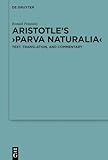Aristotle’s ›Parva naturalia‹ : Text, Translation, and Commentary / ed. by Ronald Polansky.
Material type: TextPublisher: Berlin ; Boston : De Gruyter, [2024]Copyright date: 2024Description: 1 online resource (VIII, 924 p.)Content type:
TextPublisher: Berlin ; Boston : De Gruyter, [2024]Copyright date: 2024Description: 1 online resource (VIII, 924 p.)Content type: - 9783111235745
- 9783111244044
- 9783111243832
- 185 23//eng/20240515eng
- B444 .P65 2024
- online - DeGruyter
- Issued also in print.
| Item type | Current library | Call number | URL | Status | Notes | Barcode | |
|---|---|---|---|---|---|---|---|
 eBook
eBook
|
Biblioteca "Angelicum" Pont. Univ. S.Tommaso d'Aquino Nuvola online | online - DeGruyter (Browse shelf(Opens below)) | Online access | Not for loan (Accesso limitato) | Accesso per gli utenti autorizzati / Access for authorized users | (dgr)9783111243832 |
Browsing Biblioteca "Angelicum" Pont. Univ. S.Tommaso d'Aquino shelves, Shelving location: Nuvola online Close shelf browser (Hides shelf browser)

|

|

|

|

|

|

|
||
| online - DeGruyter Youth, Identity, and Re-Fashioning Popular Music in Israel : 1950s–1980s / | online - DeGruyter Japan, the Jews, and Israel : Similarities and Contrasts / | online - DeGruyter Physiognomy at the Crossroad of Magic, Science, and the Arts / | online - DeGruyter Aristotle’s ›Parva naturalia‹ : Text, Translation, and Commentary / | online - DeGruyter Age of Exploration : How Chinese Scientists and Administrators Discovered China / | online - DeGruyter Kultur / | online - DeGruyter An Intimate Relationship : Non-State Armed Actors and Statehood / |
Frontmatter -- Contents -- Acknowledgments -- Abbreviations -- Introduction -- On Sense and Sensible Objects (De sensu et sensibilibus) περὶ αἰσθήσεως καὶ αἰσθητῶν -- On Memory and Recollection (De memoria et reminiscentia) περὶ μνήμης καὶ ἀναμνήσεως -- On Sleep and Waking (De somno et vigilia) περὶ ὕπνου καὶ ἐγρηγόρσεως -- On Dreams (De insomniis) περὶ ἐνυπνίων -- On Prophecy on account of Sleep (De divinatione per somnum) περὶ τῆς καθ᾿ ὕπνον μαντικῆς -- On Motion of (Mortal) Living Beings (De motu animalium) περὶ ζῴων κινήσεως -- On Length and Shortness of Life (De longitudine et brevitate vitae) περὶ μακροβιότητος καὶ βραχυβιότητος -- On Youth and Old Age (De juventute et senectute) περὶ νεότητος καὶ γήρως -- Conclusion -- Bibliography -- Index
restricted access online access with authorization star
http://purl.org/coar/access_right/c_16ec
Aristotle’s Parva naturalia continues the investigation begun in the De anima. The De anima defines the soul and treats its main powers, nutrition, sense perception, intellection, and locomotion. The Parva naturalia — On sense and sensible objects, On memory and recollection, On sleep, On dreams, On divination in sleep, On motion of animals (De motu animalium ), On length and shortness of life, and On youth and old age and respiration — attends more to bodily involvement with soul. While each work offers fascinating and challenging insights, there has never been as extensive a commentary covering them together. A reason is that the works have often been viewed as incidental and even inconsistent. The De motu animalium has not typically been included, when viewed as an isolated work on animal locomotion. This commentary argues that the treatises, considered together and with the De motu among them, display a tight sequence manifesting an artful, yet easily overlooked, design. We reveal many techniques of Aristotle’s writing that have received little consideration previously. Our commentary contributes to a unified and comprehensive account of Aristotle’s overall project regarding the soul and its connections with the body.
Issued also in print.
Mode of access: Internet via World Wide Web.
In English.
Description based on online resource; title from PDF title page (publisher's Web site, viewed 20. Nov 2024)


